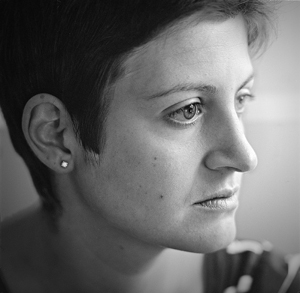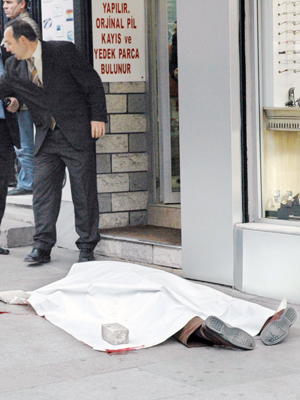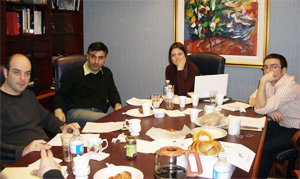Professor Payam Akhavan teams up with a Turkish historian and a McGill Law student with personal ties to the Armenian genocide to take on the Turkish government on freedom of speech
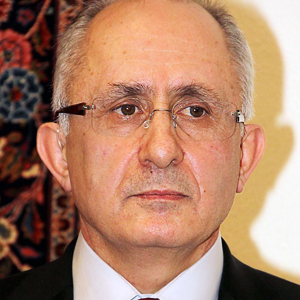 Taner Akçam, January 2010, giving a lecture in Lebanon. 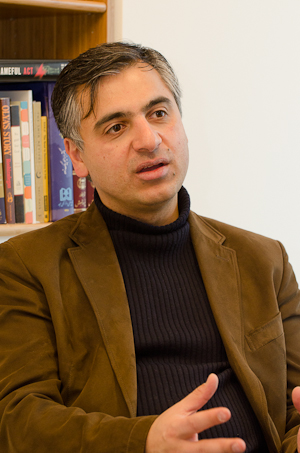 “We believed that the best way in which the issue of the Armenian genocide can be solved is to establish a democratic space in which scholars, activists and citizens can engage in debate to come to terms with the past. When Hrant Dink was murdered, the issues assumed a totally different magnitude.”
|
As any avid consumer of Hollywood action movies knows all too well, the battle for justice never ends. And as every aspiring law student suspects, a legal education can sometimes lead to exactly the kind of epic victory in the name of justice that is so frequently glorified in popular television and cinema.
For Sheila Paylan, BCL/LLB ’07, that victory came earlier this fall, when the European Court of Human Rights (ECHR) unanimously declared that the act of acknowledging the 1915 Armenian genocide could no longer be considered a crime in Turkey.
In 1915, Armenians living in the Ottoman Empire were systematically killed or deported in a series of events that is widely considered as one of the first genocides of the modern era. Discussion of the genocide as such in Turkey (the successor state of the Ottoman Empire), however, is considered a denigration of Turkishness, a criminal offense punishable under Article 301 of the Turkish Criminal Code. In prosecutions that made headlines around the world, Nobel Literature laureate Orhan Pahmuk was investigated for this crime and journalist Hrant Dink was actually convicted on the same terms in October 2006.
Paylan, a descendant of Armenian genocide survivors, had long held an avid interest in the subject and the prosecutions, and when Dink became the target of violent threats following his conviction and then was shot at point blank range in broad daylight by a young extremist in 2007, she was devastated, not only because Dink was a courageous and respected voice on the subject but also because he was a close friend of her her family.
At the same time, Paylan had recently taken a course in international humanitarian law with McGill professor Payam Akhavan and he contacted her in the months following Dink’s assassination with the assignment of her dreams: Akhavan had agreed to represent a Turkish professor, Taner Akçam, in his claim to the ECHR that the Turkish government had interfered with his right to freedom of expression and he wanted Paylan to serve as his research assistant.
Taner Akçam had researched and published extensively on the Armenian genocide, including a landmark 2006 book entitled A Shameful Act: The Armenian Genocide and the Question of Turkish Responsibility, which he traveled to McGill to discuss in early 2007. It was then that Akçam first met Akhavan and that the two mulled over the possibility of challenging the notorious Article 301 which had been the basis for Dink and Pahmuk’s prosecutions.
“We believed that the best way in which the issue of the Armenian genocide can be solved is to establish a democratic space in which scholars, activists and citizens can engage in debate and dialog to come to terms with the past,” Akhavan explained. “And when Hrant Dink was murdered just a few months after Taner Akçam and I first met, all the issues we had discussed assumed a totally different magnitude.”
Dink’s murder was but one in a string of violent and intimidating acts associated with public discussion of the genocide, Akhavan said. “So we decided to file an application before the ECHR to challenge Article 301 because it stood in the way of what we considered a necessary dialog… and because we felt it was keeping the Turkish people hostage to events that transpired a century ago.”
When Paylan received Akhavan’s request for research assistance, she jumped at the opportunity. “I had seen the photo of Hrant Dink lying in the street covered with a tarp – it was devastating but at the same time extremely motivating,” she recalled. “I worked more furiously over Mr. Akçam’s case than I had ever worked on anything else in my life. I don’t think I slept for six months and I had this photo next to me the whole time, fueling me.”
The case was complex, Paylan and Akhavan both agreed. The legal team had to first prove the case’s admissibility to the ECHR and that the case fell under the Court’s jurisdiction, knowing that an inability to do so might mean that the case would spend years winding its way through the Turkish judicial system before arriving before the ECHR.
The next hurdle was to prove that Taner Akçam had indeed been victimized by Article 301 and that it had interfered with his freedom of speech, an argument the Turkish government strongly rejected by arguing that Akçam had been given special access to historical archives and by pointing out that they had dropped the Article 301 charges against him (an action undertaken following the outcry in response to Dink’s murder).
“We knew the case was a bit of a long shot and required very careful analysis and research,” Paylan said. “I have personally had more than one experience to suggest that this cause is a lost one and that the politics surrounding it are too volatile to allow for any fair or reasonable discussion. And to be honest, in the five years since I embarked on this case in 2007, I had become increasingly convinced that we would lose or that the Court would find a reason to dismiss our application.”
On October 25, 2011, the Court unanimously held that the Turkish government’s application of Article 301 of the Turkish Criminal Code had indeed interfered with Akçam’s right to freedom of expression and that this interference constituted a violation of Article 10 of the European Convention on Human Rights.
It was the victory of which Paylan, Akhavan and Akçam had dreamed but had not dared to expect.
“I have no words to describe the feeling I have when reading the Court’s judgment,” Paylan said. “Suffice it to say that it has utterly changed my life… to have truly experienced the feeling of justice having been rendered.”
Working with Paylan on the case lent an especially meaningful dimension to the victory, added Akhavan. “We tend to think in very utilitarian terms about a case as important only if it results in certain damages, and we often forget how important it is for the process of healing to simply have a context in which the truth is recognized and vindicated,” he said, citing reconciliation processes in South Africa, Argentina, Chile, the former Yugoslavia and Rwanda.
“In many of these cases, when so many years have transpired and there is no one else to prosecute or punish, that recognition of the truth itself is very significant in allowing for a healing or reconciliation to take place,” he said, concluding that he has high hopes for a future of dialog in Turkey: “If the Turkish government were to adopt a wise approach, they would stop their policy of denial, adopt a neutral position and create a space in which these issues can be discussed.”
Article: Victoria Leenders-Cheng.
Photos: Taner Akçam: Studio Ashnag, reproduced with permission. Payam Akhavan: Lysanne Larose. Sheila Paylan: Jannes Bolten. Hrant Dink: Evrensel media (Turkey)

